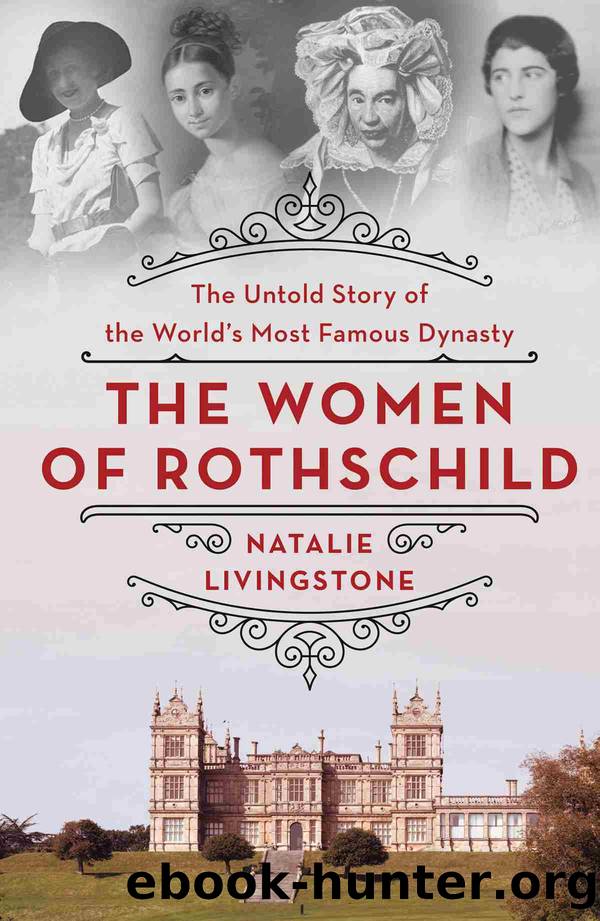The Women of Rothschild: the Untold Story of the World's Most Famous Dynasty by Natalie Livingstone

Author:Natalie Livingstone [Livingstone, Natalie]
Language: eng
Format: epub
Publisher: St. Martin's Publishing Group
Published: 2022-10-10T00:00:00+00:00
28
Elevations
DURING THE EARLY 1880s Gladstoneâs support for home rule and his failure to speak out against antisemitic pogroms in the Russian Empire had lost him the support of many Anglo-Jewish Liberals â Natty among them â but Cyril remained a dogged ally.1 His loyalty was rewarded: after his Brecon constituency was abolished in 1885, he was ushered into the new seat of Luton. âI am delighted that he has not lost his favourite occupation,â wrote Louisa, who had been to Luton to see Cyrilâs victory declared.2 In early 1886 Gladstone offered him the role of Liberal Chief Whip and Lord of the Treasury, and in 1892 he was offered a barony. Constance had managed to suppress her misgivings about the role of whip â it was, she thought, an unprincipled role that made one âslave to the Houseâ and âtyrant of the numbersâ â but when it came to the barony, she could not help airing her doubts.3 By the early 1890s the Lords was coming to be seen by Liberals as a constitutionally problematic house, and Constance was convinced that the Commons was the place for ârealâ political work.4 On the way back from the opera festival in Bayreuth, Constance wrote to Cyril to express her misgivings. After a couple of days, having seen how much the title meant to him, she dropped her opposition and wrote supportively about his chosen name, which was âLord Batterseaâ, after the estates he had inherited from his father. But Cyril had been âhurt and vexedâ by the initial letter, and would, she feared, ânever quite forget itâ.5
If he did, it was only because this falling-out was dwarfed by a cataclysmic dispute over another role, offered to him less than a year later. Arriving at Surrey House one afternoon in January 1893, Constance saw a telegram addressed to Cyril lying on the table.6 It was from Lord Ripon â a loyal Gladstonian and Secretary of State for the Colonies. She waited nervously for Cyrilâs return. He arrived in a celebratory mood. âI have good news for you,â he said, flinging himself into a chair. âI have been offered the governorship of New South Wales.â The Australian territory was one of the more prestigious colonial governorships â and one of the furthest away. The posting would be for five years, meaning that should Cyril take the position, Constance might never again see her mother Louisa, who was in her seventies. The news, Constance wrote, âstruck me like a knifeâ.7
That evening she sat distractedly through a play at the Haymarket Theatre, before spending a sleepless night at Surrey House. The next day, following a Rescue and Prevention committee meeting, she went to see Lord Ripon herself. Depleted by sleeplessness, she âbroke down & cried my heart outâ. Lord Ripon was âso kindâ, but by this point things were beyond his control.8 Annie acted as a go-between, travelling to and fro between Cyril, at the House of Lords, and Surrey House, where her sister was feeling âmore and more wretchedâ.
Download
This site does not store any files on its server. We only index and link to content provided by other sites. Please contact the content providers to delete copyright contents if any and email us, we'll remove relevant links or contents immediately.
| Civilization & Culture | Expeditions & Discoveries |
| Jewish | Maritime History & Piracy |
| Religious | Slavery & Emancipation |
| Women in History |
Cecilia; Or, Memoirs of an Heiress — Volume 1 by Fanny Burney(31348)
Cecilia; Or, Memoirs of an Heiress — Volume 3 by Fanny Burney(30946)
Cecilia; Or, Memoirs of an Heiress — Volume 2 by Fanny Burney(30905)
The Secret History by Donna Tartt(16653)
Sapiens: A Brief History of Humankind by Yuval Noah Harari(13069)
Leonardo da Vinci by Walter Isaacson(11914)
The Radium Girls by Kate Moore(10914)
Sapiens by Yuval Noah Harari(4549)
The Wind in My Hair by Masih Alinejad(4427)
How Democracies Die by Steven Levitsky & Daniel Ziblatt(4408)
Homo Deus: A Brief History of Tomorrow by Yuval Noah Harari(4287)
Endurance: Shackleton's Incredible Voyage by Alfred Lansing(3852)
The Silk Roads by Peter Frankopan(3772)
Man's Search for Meaning by Viktor Frankl(3646)
Millionaire: The Philanderer, Gambler, and Duelist Who Invented Modern Finance by Janet Gleeson(3574)
The Rape of Nanking by Iris Chang(3525)
Hitler in Los Angeles by Steven J. Ross(3444)
The Motorcycle Diaries by Ernesto Che Guevara(3342)
Joan of Arc by Mary Gordon(3264)
